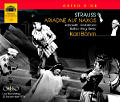ORFEO International – Reviews
Important Releases Briefly Introduced
November 2011
ORFEO 2 CD C 817 112 I
Richard Straus: Ariadne auf Naxos
Many productions at the Vienna State Opera can claim to be model interpretations of the works in question, and this is certainly true of the new production of Richard Strauss's Ariadne auf Naxos that opened well over a quarter of a century ago in November 1976. The production is still in the repertory after thirty-five years, and even if the casts have naturally changed in the meantime, a number of the singers who took leading roles in the 1976 production have continued to appear in Vienna over the years and in some cases over the decades. 
C 817 112 IAs Zerbinetta, for example, Edita Gruberova was heard more than ninety times at the State Opera alone, mostly in the 1976 production. The brilliance of her coloratura singing and the subtlety of her characterization made her a popular favourite with press and public alike, just as they have done in her present-day repertory. Another singer who remains at the heart of our musical life is Agnes Baltsa, for all that she appeared far less frequently as the youthfully impetuous Composer. Many of the members of the 1976 audience must have suspected that in the brief duet between Gruberova and Baltsa they were hearing two of the leading bel canto exponents of later years, making it all the more gratifying to be able to recapture that moment now on CD. It would have occurred to few people in Vienna in 1976 that the other main roles in Ariadne can seem thankless tasks, especially with set beside competition of this order. In 1976 the roles of Ariadne and Bacchus were taken by Gundula Janowitz and James King, by this date in their careers both fully attuned to their roles. With casting like this, the difficult final scene in the opera with its “miracle of transformation” does indeed become the culmination of the evening after Gundula Janowitz, with her laser-sharp accuracy, has already triumphed in Ariadne's great laments and James King has mastered the terrors of the young god's brief entrance scene. King sang this role over a period of three decades, fully equal to the demands of the part and entirely worthy of being immortalized on disc. And who ultimately can compete with Karl Böhm on the conductor's podium in terms of his long experience of Ariadne? If the first night flowed along with an ideal balance between stage and pit and if even the smallest of the secondary roles were convincingly cast, then this was due above all to a great conductor intimately familiar with Strauss's music.
top |